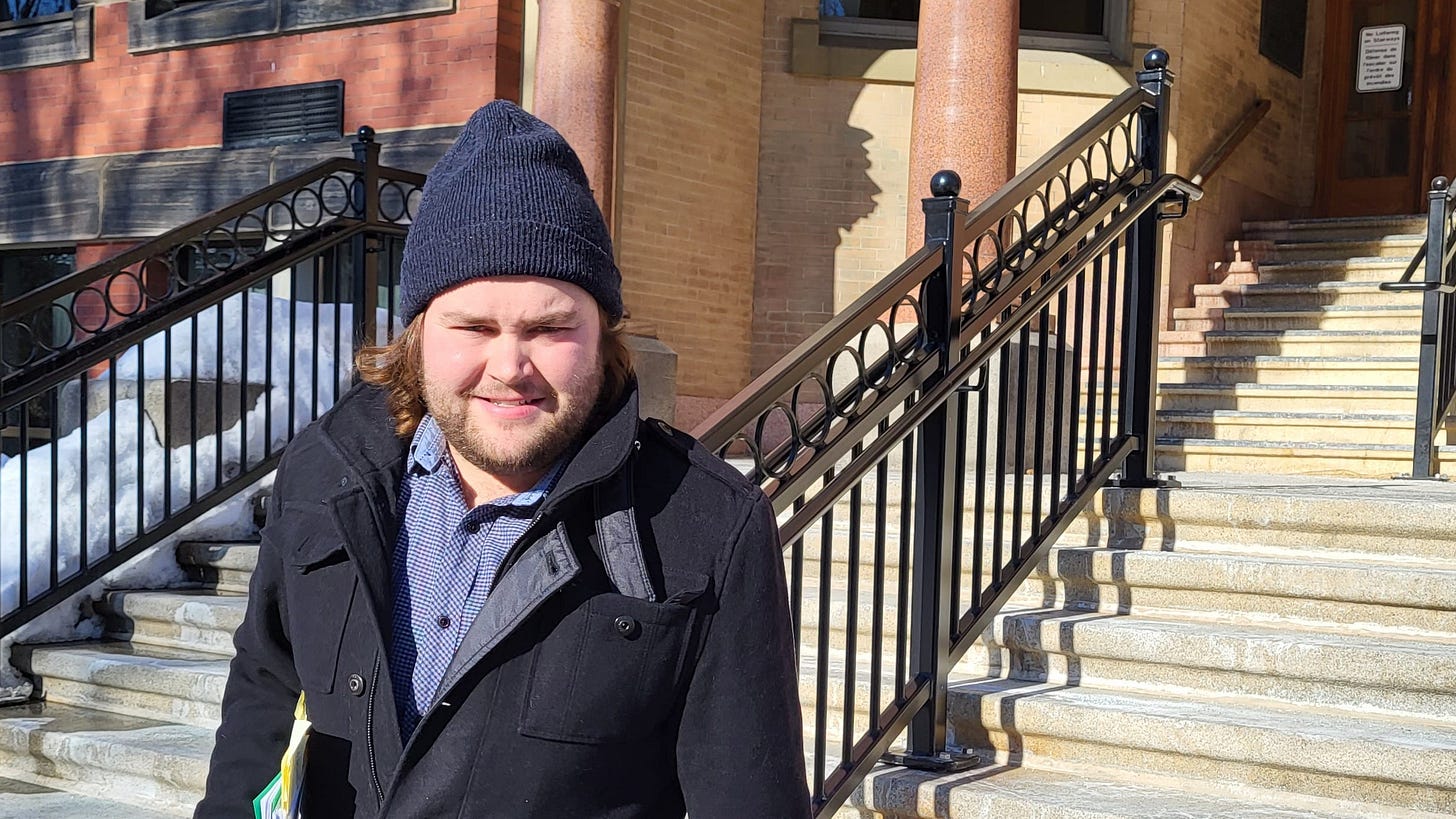Further appeal sought in quest to sue judge
Pandemic-mandate protesters seek permission to take case to New Brunswick’s highest judicial authority in beef with provincial court jurist
Two opponents of government-imposed pandemic restrictions whose small claim against a Fredericton judge was dismissed, as was their initial appeal, are taking their case to the next level.
Mitchell Albert, 25, of Kintore, near Perth-Andover, filed a notice seeking leave to appeal to the New Brunswick Court of Appeal on June 29 as part of his ongoing campaign to sue provincial court Judge Kenneth Oliver.
Albert, and Sean Patrick Kenney, 27, formerly of New Maryland, filed a small-claim action against Oliver in early 2022.
They’d clashed with the judge in Fredericton provincial court in 2021 and 2022 over the imposition of pandemic precautions in the courtroom, notably masking requirements, and they were seeking $3,000 from Oliver and an order barring him from presiding over their cases and those of other defendants opposed to pandemic precautionary measures..
Oliver’s lawyers filed a motion for dismissal in small claims court, successfully arguing the lawsuit was statute-barred under the Provincial Court Act.
Albert and Kenney appealed that ruling, but in a decision issued in late May, Court of King’s Bench Justice Terrence Morrison upheld the small-claims adjudicator’s decision, finding it was on point.
The recently filed notice seeking leave to appeal aims to challenge Morrison’s decision.
Unlike the original small-claim action and the King’s Bench appeal, the new court filing only lists Albert as an appellant. No mention is made on the paperwork of Kenney.
When reached for comment Tuesday, though, Albert said he isn’t acting solo in the Court of Appeal matter.
“[Kenney] is still on the case as well,” he wrote in a message to the Fredericton Independent. “It's just the way the paper got filled out but we are both still on it”
Kenney didn’t respond to messages seeking comment and confirmation Tuesday.
Citing Supreme Court of Canada cases
"In my view, the adjudicator's decision with respect to the question of judicial immunity is sound and in accordance with well-founded and long-standing legal principles," Morrison wrote in his May 30 decision.
"I find no error of law in the adjudicator's decision."
In his notice for leave to the Court of Appeal, Albert lists a single ground of appeal. A handwritten note on the form states only, “Ruling does not follow president [sic] from Supreme Court.”
Attached to the notice are two Supreme Court of Canada decisions: a combined decision in the cases of R. v. Eldorado Nuclear Ltd. and R. v. Uranium Canada Ltd. from 1983, and Roncarelli v. Duplessis from 1959.
The latter case stemmed from the cancellation of restaurateur Frank Roncarelli’s liquor licence by then-premier of Quebec Maurice Duplessis. The Supreme Court of Canada found the premier abused his authority in a politically motivated retaliation.
The Eldorado Nuclear Ltd. and Uranium Canada Ltd. decision was the result of those Crown agencies being charged under the Combines Investigation Act and accused of conspiring with others to suppress competition uranium production and sales in Canada.
The agencies argued they were immune from prosecution, but a Supreme Court majority disagreed.
“There is no section in the Combines Investigation Act or the Interpretation Act which makes the act applicable to Her Majesty,” the 1983 decision states.
“The effect of Crown immunity is not that the Crown is immune from prosecution even though there has been an unlawful act, rather, there is no unlawful act under the statute because the statute does not apply to the Crown. Crown immunity extends to agents and servants because the Crown only acts through agents and servants.”
Albert had cited those cases before Morrison to support his argument that Oliver or any other judge can’t be immune from being sued.
However, while those Supreme Court precedents deal with limits to government authority and the ability to prosecute government officials and agencies, they’re not on point when it comes to judicial immunity.
Furthermore, New Brunswick’s Provincial Court Act expressly gives judges immunity from being sued for actions they take on the bench.
Though Albert and Kenney have failed thus far to bar Oliver from presiding over their cases, they’ve indirectly gotten their wish - though in a manner completely unrelated to their court cases.
Oliver is currently on suspension with pay as a result of misconduct in a drug-trafficking prosecution over which he presided last year.
Provincial court Chief Judge Marco Cloutier suspended him Oct. 3 after it was learned the impugned judge had an improper communication with Fredericton police officers ahead of an evidentiary ruling in the case.
Oliver had contacted the officers outside of court, after their testimony a hearing on admissibility of evidence in the case.
Don MacPherson can be contacted at ftonindependent@gmail.com.






I am truly impressed that our Editor (etc.) has not just read the SCC decisions cited, but also provided a (correct) synopsis of them and their applicability to the matter at hand. This is much better writing that the overwhelming majority of what actually appears in print media. Thank-you, Don.
Judge Kenneth Oliver should be suspended without pay, he should be fired.